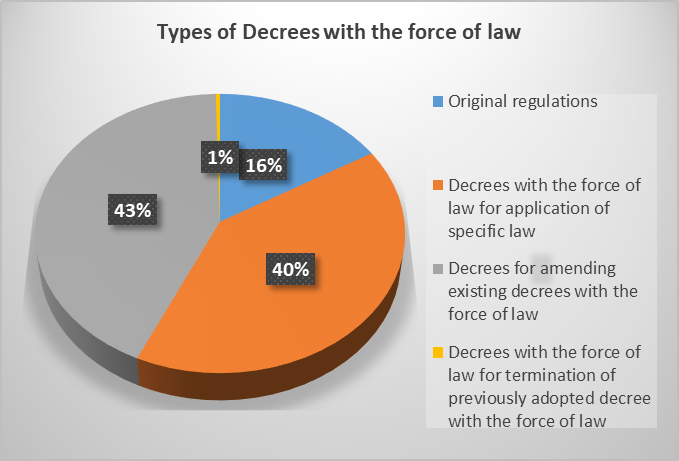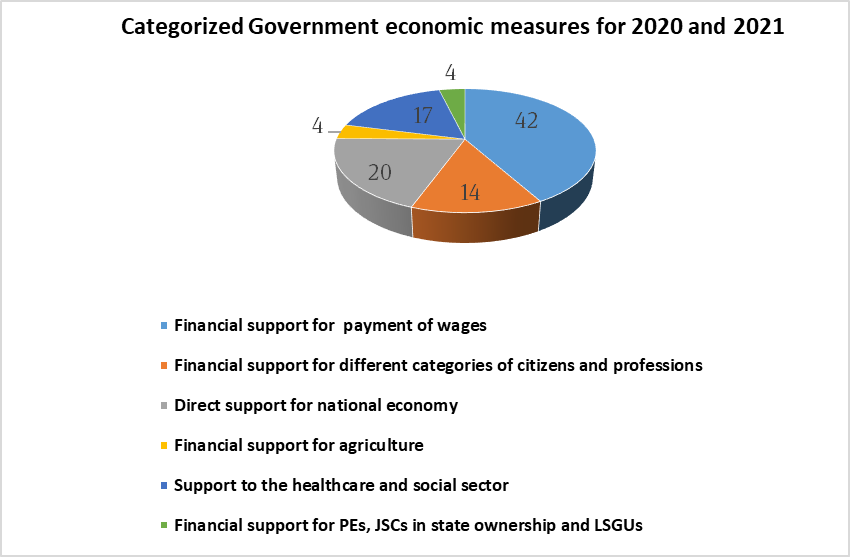
STATE AUDIT OFFICE
Press release
Skopje, 29.04.2022
576 million euros were planned and 427 million realized for the six packages of Government measures for mitigating negative impact of Covid pandemic
The absence of an integrated system of records for the realization of financial support, the reduced transparency and accountability in the implementation of economic measures and the inability to fully monitor effects for efficient recovery of the national economy are the key identified shortcomings in the implementation, monitoring and efficiency of government economic measures
The State Audit Office carried out performance audit on the topic “Government economic measures for coping with the crisis caused by Covid-19 pandemic” in line with 2021 Annual Work Program.
The audit objective was to answer the question whether there is an efficient system for planning, implementing, monitoring and reporting on national economic measures for coping with Covid -19 consequences.
For protection of spreading and dealing with the consequences of Covid-19, state of emergency was declared on the entire territory of the country from 18 March to 22 June 2020.
During the state of emergency and until its completion, the Government received authorizations and adopted 250 Decrees with the force of law. The audit concluded that 43% of the adopted Decrees refer to amending existing ones due to the uncertain dynamics of the pandemic. However, it is also an indicator that the adoption of Decrees was done without comprehensive planning, analysis and evaluation.

Concerning the process of planning economic measures to deal with the crisis and consequences of Covid-19, the auditors found that the decisions on the strategic priorities of the Government for 2021 and 2022, including the strategic priority "Dealing with the global pandemic caused by the coronavirus Covid-19 " are general, without specific economic aspects for dealing with the consequences of the economic crisis, without priority objectives for their realization, as well as without a long-term strategic document for dealing with the health and economic crisis caused by the pandemic.
To mitigate the consequences of the crisis caused by Covid-19, in the period from 19.03.2020 to 20.04.2021 the Government adopted six packages of economic measures, which cover and support business entities from the public and private sector and citizens, divided in three groups:
- measures that cause reduced budget revenue;
- measures that have economic impact, without fiscal implications on the Budget of RNM; and
- measures that cause expenditures, i.e. have direct fiscal implications on the Budget of RNM, amounting to 35.409.940.000 denars or about 576 million euros. As of 29 October 2021, the amount of realized funds is 24.948.428.000 denars, i.e. approximately 427 million euros.
With the performed categorization of adopted economic measures in line with the report for the first four packages and the submitted data from the competent bodies for the fifth and sixth package of economic measures, the auditors determined that largest part of realized funds refer to financial support for payment of salary, allocated funds for support of development and recovery of the economy, funds for the healthcare and social sector, etc.

The published final audit report states that there is lack of reliable information to confirm that assessment and analyses were made on the potential impact and effects of the measures on the economy as a whole during planning and design of the six packages of economic measures.
Regarding implementation, monitoring and evaluation of effectiveness of economic measures for coping with the pandemic, the auditors note absence of an integrated system of records for the realization of the financial support, which reduces transparency and accountability of the implementation of economic measures, i.e. it is not possible to follow the full effects and their contribution for stabilization and efficient recovery of the national economy.
Part of the economic measures of the Government that did not cause expenditure in the Budget of RNM aimed at supporting companies, are interest-free credit lines that in 2020 and 2021 were realized through the Development Bank of North Macedonia. As of 30 October 2021, from the planned 3.473.250.000 denars, i.e. 56.5 million euros, 2.734.252.000 denars, i.e. 44.4 million euros were paid.
Regardless of the high level of realization, i.e. 79% of the financial support for business entities through approved interest-free loans for maintenance of liquidity of 4119 business entities (1957 micro, 1791 small, 75 medium-sized companies, 232 sole proprietors, 61 crafts and 3 private healthcare facilities), the small number of business entities that applied for loans is evident, as well as the high percentage of rejected applications.
Out of 5277 business entities that have applied for interest-free loans, 1144 applications were rejected. This is an indication that the volume of planned funds, the selection of activities affected by the pandemic, as well as the uneven criteria for approval in all credit lines created by the competent authorities do not create equal opportunities for "recovery" from Covid-19 consequences of business entities in the country and have an impact on the success of the measures in terms of scope and number of users of interest-free loans credit lines.
At the same time, the auditors did not receive analysis on the parameters used by the Government for selecting sectors that are most affected by Covid-19 crisis.
Within the Government Program P1 in November and December 2020, the Government adopted Decisions for approval of funds from the Budget of RNM for 2020, as an addition to the fourth package of economic measures to deal with the crisis. Through the General Secretariat of the Government were paid 1.049.705.000 denars, i.e. over 17 million euros, of which 87% are financial support for the state sector (public enterprises, state-owned joint stock companies, local self-government units), while 13% are financial support for the private sector.
With the inspection of the Decisions and the submitted financial documentation, the auditors found insufficient transparency in the allocation of funds for financial support, distribution without established criteria for selection of institutions and municipalities, without criteria for the amount of approved funds, without purpose of allocation of the assets, as well as without performing controls.
Some of the institutions used allocated funds in the amount of 67.780.000 denars to pay salaries to employees without legal basis. In addition, the basis for allocating part of the funds from P1 program does not correspond to the basic purpose of the financial support and the funds were allocated for: reconstruction of the Universal Hall, procurement of machinery and trucks, and settlement of obligations incurred before the pandemic.
In May 2021, the Government published public announcements for granting financial support to business entities from certain activities (licensed travel agencies, operators and agencies in the industry for organizing events, restaurants for weddings, caterers registered with a specific code of priority activity, photo studios and fitness centers, nightclubs, playgrounds and children’s resorts), in order to recover the economy and to come out of the economic crisis. For this purpose, funds in the amount of 499.507.000 denars, i.e. over 8 million euros were paid.
By inspecting the public announcements and the adopted Decisions, the auditors determined that there is no established manner for reporting of users on the fulfillment of conditions for using the financial support, no control and monitoring mechanism of the Government and no funds for ensuring activation of the financial support and collection of funds in case of non-fulfillment of required conditions and no return by the users.
The third set of economic measures adopted by the Government in May 2020 contains Measure to support the private sector for new markets, competitiveness and modernization, with planned funds in the amount of 1.200.000.000 denars, i.e. 19.5 million euros. With the inspection of the entire documentation, the audit determined the following shortcomings:
- The Decree and the public announcement do not contain provisions for the business entities whose applications were rejected (representing 49% of the total number of entities that applied) to be able to exercise the right to receive financial support through an objection / appeal / lawsuit, as well as to be notified on the reasons why their application was rejected;
- The Decree does not prescribe misdemeanor provisions with determined fines (penalties) for the business entity that has not used the funds for the purpose in line with the investment plan for which the support was approved;
- As of 31 October 2021, 69% of the business entities that were granted financial support did not comply with the prescribed legal obligation and did not submit Project Progress Report to the General Secretariat.
Activities were taken upon the Draft Report of the Certified State Auditor and control of the process of implementation of investment projects and reports of business entities was conducted. It was determined that as of 31.12.2021, 130 business entities, i.e. 33% of the total number of users of financial support have not completed at least 80% of the investment, and therefore:
- 16 business entities returned the allocated funds to the Budget of RNM in the amount of 24.825.000 denars (about 400.000 euros); and
- for 114 business entities, activities were initiated for activation of bills of exchange and bill of exchange statements in the form of a notary deed with executive clause, which will return funds in the Budget of RNM in the amount of 238.684.000 denars (about 3,8 million euros).
To overcome the above-mentioned shortcomings, the auditors gave recommendations to the competent institutions for improving the realization thereof, to provide added value and to strengthen and create efficient system for planning, implementing, reporting and monitoring in state of emergency or crisis for coping with consequences on the national economy.
Press contact:
Albiona Mustafa Muhadziri +389 72 228 203 [email protected]
Mijalche Durgutov +389 70 358 486 [email protected]
Martin Duvnjak +389 75 268 517 [email protected]

